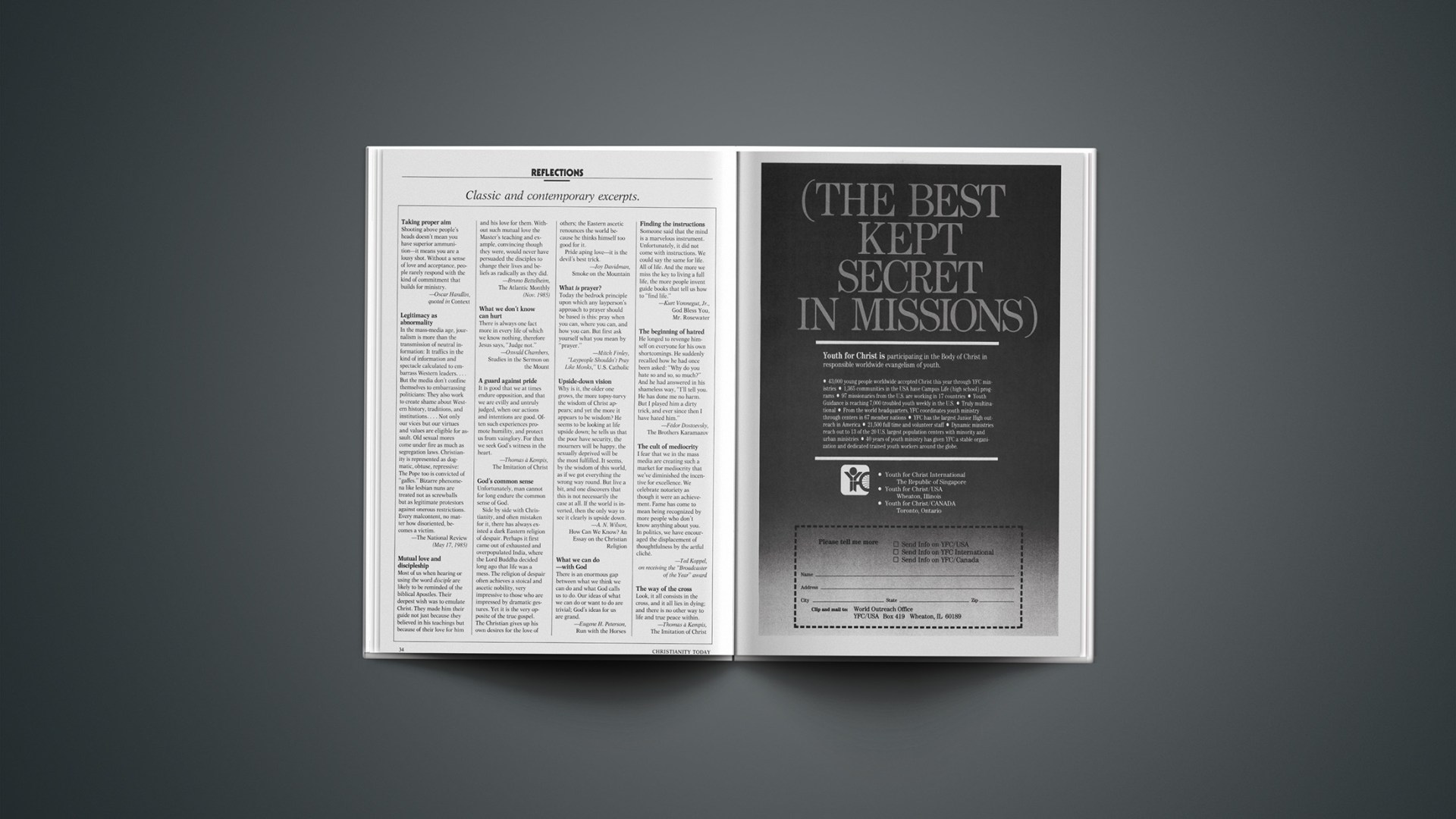Classic and contemporary excerpts
Taking Proper Aim
Shooting above people’s heads doesn’t mean you have superior ammunition—it means you are a lousy shot. Without a sense of love and acceptance, people rarely respond with the kind of commitment that builds for ministry.
—Oscar Handlin, quoted in Context
Legitimacy As Abnormality
In the mass-media age, journalism is more than the transmission of neutral information: It traffics in the kind of information and spectacle calculated to embarrass Western leaders.… But the media don’t confine themselves to embarrassing politicians: They also work to create shame about Western history, traditions, and institutions.… Not only our vices but our virtues and values are eligible for assault. Old sexual mores come under fire as much as segregation laws. Christianity is represented as dogmatic, obtuse, repressive: The Pope too is convicted of “gaffes.” Bizarre phenomena like lesbian nuns are treated not as screwballs but as legitimate protestors against onerous restrictions. Every malcontent, no matter how disoriented, becomes a victim.
—The National Review (May 17, 1985)
Mutual Love And Discipleship
Most of us when hearing or using the word disciple are likely to be reminded of the biblical Apostles. Their deepest wish was to emulate Christ. They made him their guide not just because they believed in his teachings but because of their love for him and his love for them. Without such mutual love the Master’s teaching and example, convincing though they were, would never have persuaded the disciples to change their lives and beliefs as radically as they did.
—Bruno Bettelheim, The Atlantic Monthly (Nov. 1985)
What We Don’T Know Can Hurt
There is always one fact more in every life of which we know nothing, therefore Jesus says, “Judge not.”
—Oswald Chambers, Studies in the Sermon on the Mount
A Guard Against Pride
It is good that we at times endure opposition, and that we are evilly and untruly judged, when our actions and intentions are good. Often such experiences promote humility, and protect us from vainglory. For then we seek God’s witness in the heart.
—Thomas à Kempis, The Imitation of Christ
God’S Common Sense
Unfortunately, man cannot for long endure the common sense of God.
Side by side with Christianity, and often mistaken for it, there has always existed a dark Eastern religion of despair. Perhaps it first came out of exhausted and overpopulated India, where the Lord Buddha decided long ago that life was a mess. The religion of despair often achieves a stoical and ascetic nobility, very impressive to those who are impressed by dramatic gestures. Yet it is the very opposite of the true gospel. The Christian gives up his own desires for the love of others; the Eastern ascetic renounces the world because he thinks himself too good for it.
Pride aping love—it is the devil’s best trick.
—Joy Davidman, Smoke on the Mountain
What Is Prayer?
Today the bedrock principle upon which any layperson’s approach to prayer should be based is this: pray when you can, where you can, and how you can. But first ask yourself what you mean by “prayer.”
—Mitch Finley, “Laypeople Shouldn’t Pray Like Monks,” U.S. Catholic
Upside-Down Vision
Why is it, the older one grows, the more topsy-turvy the wisdom of Christ appears; and yet the more it appears to be wisdom? He seems to be looking at life upside down; he tells us that the poor have security, the mourners will be happy, the sexually deprived will be the most fulfilled. It seems, by the wisdom of this world, as if we got everything the wrong way round. But live a bit, and one discovers that this is not necessarily the case at all. If the world is inverted, then the only way to see it clearly is upside down.
—A. N. Wilson, How Can We Know? An Essay on the Christian Religion
What We Can Do—With God
There is an enormous gap between what we think we can do and what God calls us to do. Our ideas of what we can do or want to do are trivial; God’s ideas for us are grand.
—Eugene H. Peterson, Run with the Horses
Finding The Instructions
Someone said that the mind is a marvelous instrument. Unfortunately, it did not come with instructions. We could say the same for life. All of life. And the more we miss the key to living a full life, the more people invent guide books that tell us how to “find life.”
—Kurt Vonnegut, Jr., God Bless You, Mr. Rosewater
The Beginning Of Hatred
He longed to revenge himself on everyone for his own shortcomings. He suddenly recalled how he had once been asked: “Why do you hate so and so, so much?” And he had answered in his shameless way, “I’ll tell you. He has done me no harm.
But I played him a dirty trick, and ever since then I have hated him.”
—Fedor Dostoevsky, The Brothers Karamazov
The Cult Of Mediocrity
I fear that we in the mass media are creating such a market for mediocrity that we’ve diminished the incentive for excellence. We celebrate notoriety as though it were an achievement. Fame has come to mean being recognized by more people who don’t know anything about you. In politics, we have encouraged the displacement of thoughtfulness by the artful cliché.
—Ted Koppel, on receiving the “Broadcaster of the Year” award
The Way Of The Cross
Look, it all consists in the cross, and it all lies in dying; and there is no other way to life and true peace within.
—Thomas à Kempis, The Imitation of Christ










